Planning your one-week Japan itinerary?
You’ve probably asked: “Can I see Tokyo, Kyoto, and Osaka in just 7 days?”
The short answer? You could—but you’ll spend more time on trains than in temples.
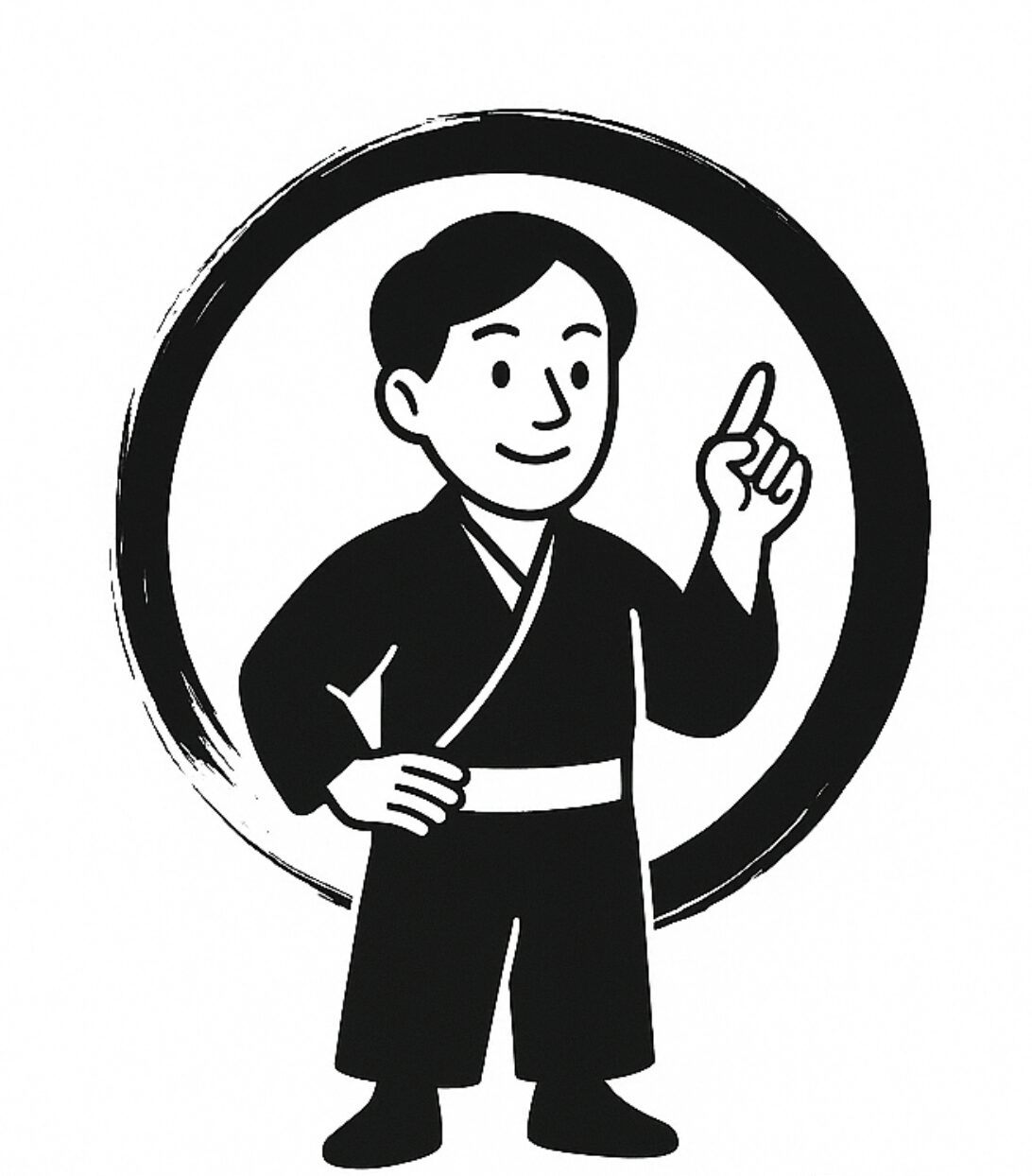 Flo
FloTrust me, I’ve seen it too many times—travelers trying to “do it all” and ending up exhausted by Day 3. Japan deserves better than a checklist-style rush.
After living in Japan for over 30 years, I’ve designed 7 unique 7-day routes to match different travel styles—whether you’re a beach lover, foodie, culture seeker, or first-timer looking for balance.
Each itinerary is optimized for season, pace, transport efficiency, and real local experiences. No fluff. No burnout.
Let’s find your perfect Japan itinerary, one day at a time.
Find Your Perfect 7-Day Japan Trip
①Japan Itinerary 7 Days: Tokyo, Hakone, Kyoto
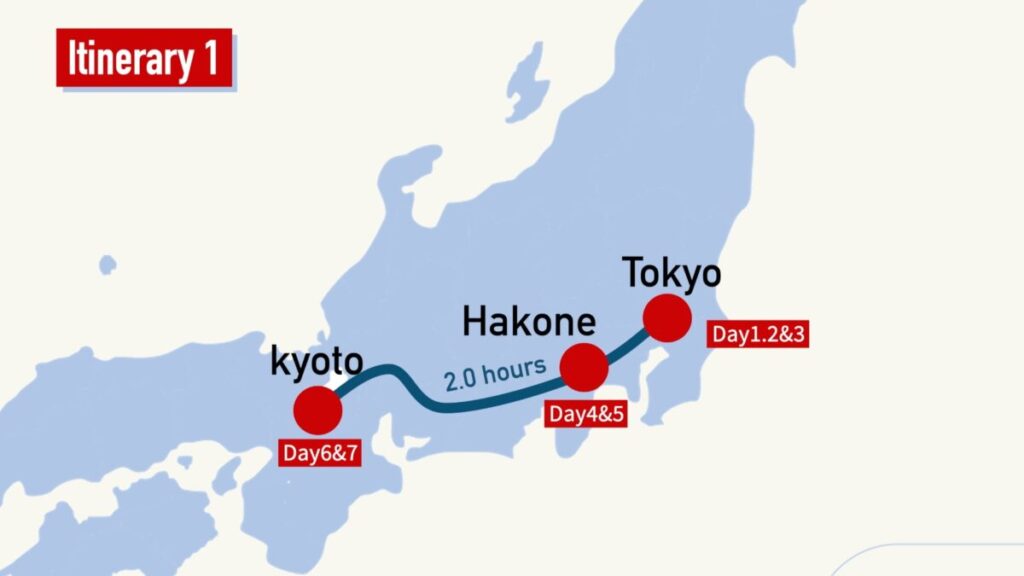

A Perfect 1-Week Journey for First-Time Visitors Seeking Culture, Nature, and Relaxation
Who is this route for?
This Tokyo–Hakone–Kyoto itinerary is ideal for:
- First-time visitors who want to experience both modern and traditional Japan
- Couples and families who value comfort and cultural depth
- Travelers who want to enjoy hot springs (onsen) without going far off the beaten path
- Anyone flying into Tokyo and out from Kansai International Airport (Osaka)
Why choose this route?
This 7-day route combines the best of Japan’s Golden Route—but with a smart twist.
By including Hakone between Tokyo and Kyoto, you get a peaceful break in the mountains, access to a natural hot spring, and a chance to see Mount Fuji (on clear days).
You won’t feel rushed, and there’s no need to backtrack to Tokyo.



Hakone on weekends? Packed. If you’re here to relax, skip the sightseeing checklist—just enjoy the onsen and let time slow down.
Bonus: All three destinations are well-connected by train, and the route is compatible with the Japan Rail Pass.
Best time to go
| Season | Pros | Things to Watch For |
|---|---|---|
| Spring (Mar–May) | Cherry blossoms, mild weather | Crowds during hanami season |
| Summer (Jun–Aug) | Lush green Hakone, summer festivals | Tokyo/Kyoto are hot and humid |
| Autumn (Oct–Nov) | Peak fall colors, great weather | Popular season—book early |
| Winter (Dec–Feb) | Crisp skies, relaxing onsen | Can be cold, short daylight |
7-Day Itinerary Overview
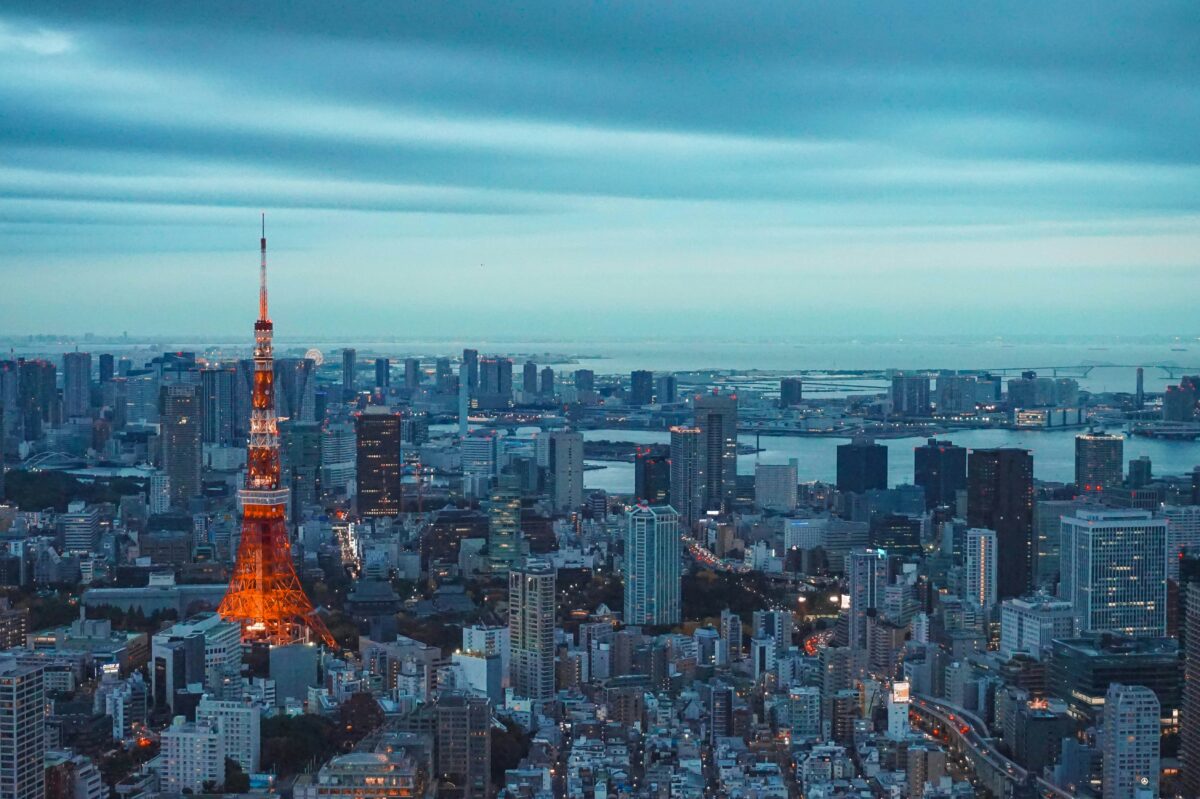

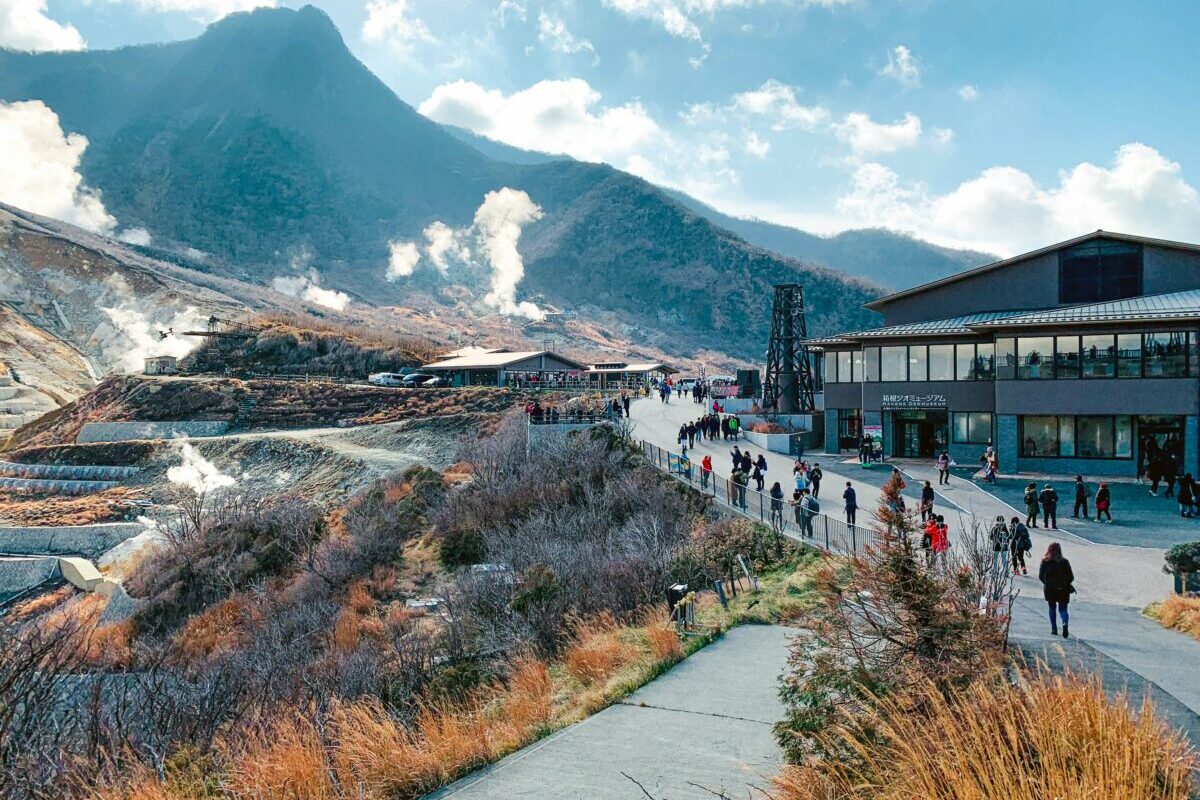

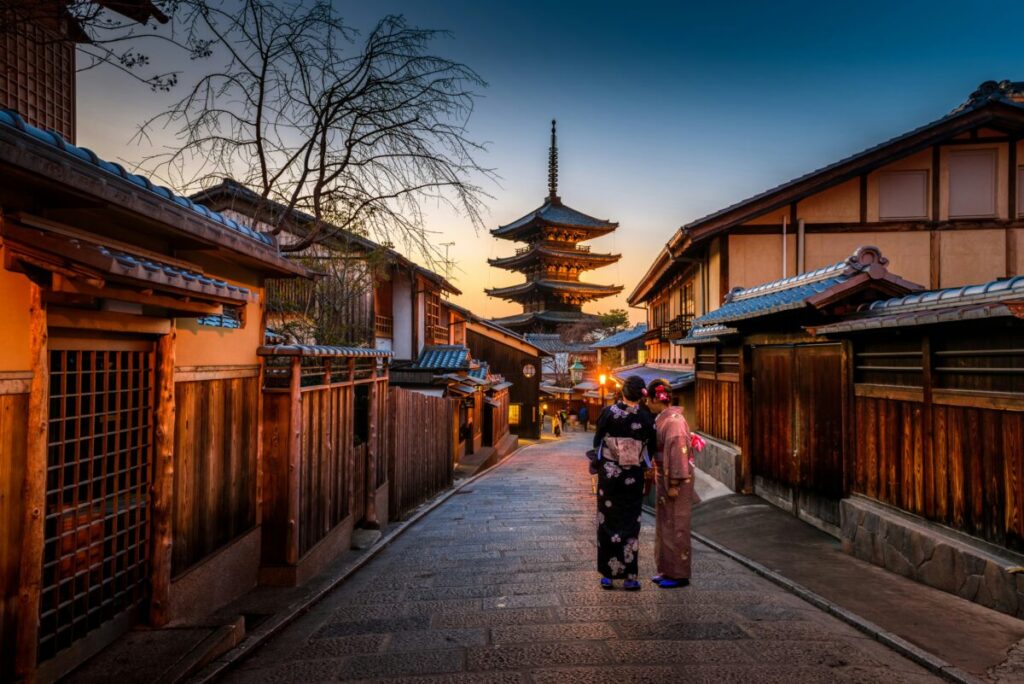

Day 1 – Arrive in Tokyo
- Land at Haneda or Narita
- Check in to hotel in Shinjuku or Asakusa
- Easy first night: explore local izakayas or visit Tokyo Skytree at sunset
Day 2 – Explore Tokyo (Modern + Traditional)
- Morning: Meiji Shrine and Harajuku
- Afternoon: Shibuya Crossing and teamLab Planets
- Evening: Street food and neon signs in Shinjuku or Golden Gai
Day 3 – Tokyo Hidden Gems
- Morning: Toyosu Outer Market and Hamarikyu Gardens
- Afternoon: Yanaka or Shimokitazawa (offbeat neighborhoods)
- Optional: Book a cultural activity (tea ceremony, cooking class)
Day 4 – Tokyo to Hakone
- Take Romancecar or Shinkansen to Hakone-Yumoto (1.5–2 hrs)
- Check in to ryokan with onsen
- Afternoon: Hakone Open-Air Museum, soak in hot springs
- Evening: Kaiseki dinner at your ryokan
Day 5 – Hakone to Kyoto
- Morning: Ride the Hakone Ropeway and Lake Ashi cruise(You can skip this)
- Afternoon: Travel to Kyoto via Odawara Station (Shinkansen, ~2 hrs)
- Evening: Stroll Gion District, spot geisha, grab dinner at Nishiki Market
Day 6 – Explore Kyoto (Classic Sights)
- Morning: Fushimi Inari Shrine
- Afternoon: Kiyomizu-dera and Sannenzaka
- Evening: Tea house experience or izakaya dinner
Day 7 – Kyoto Slow Morning & Departure
- Morning: Arashiyama Bamboo Grove (early to beat crowds)
- Travel to Kansai International Airport (via Haruka Express or airport limousine)
Total Transportation Cost Estimate
| Route | Estimated Cost (JPY) |
|---|---|
| Tokyo → Hakone (Romancecar or JR) | ¥2,500–4,000 |
| Hakone → Kyoto (via Odawara, Shinkansen) | ~¥13,000 |
| Kyoto → Kansai Airport | ~¥3,000 |
| Local transport (subway, buses, etc.) | ~¥5,000 |
| Optional: JR Pass (7-day) | ~¥50,000 |
Total Budget Estimate (Per Person, Mid-range Style)
| Category | Estimated Cost (JPY) |
|---|---|
| Accommodation (6 nights) | ¥65,000 – ¥85,000 |
| Transportation (as above) | ¥23,000 – ¥25,000 |
| Food (~¥6,000/day) | ¥42,000 |
| Activities & admission | ¥10,000 |
| Total | ¥140,000 – ¥162,000 |
| (in USD) | ~$880 – $1,050 |



Want to save without sacrificing comfort? Travel off-season (late January or early June), book accommodations near stations, and grab a prepaid IC card like Suica or ICOCA to breeze through public transport.
Pro Tips from a Local
- Avoid Golden Week (late April–early May): Crowded and expensive
- Ship your luggage from Tokyo to Kyoto using Yamato Transport—it makes your Hakone stay light and stress-free
- Book your Hakone ryokan early, especially if it includes private onsen and meals
- Don’t cram your days—Japan rewards those who take it slow



Kyoto’s major temples get packed after 9am. I always tell friends to start with Fushimi Inari around 7am—zero crowds and beautiful morning light.
②Japan Itinerary 7 Days: Tokyo and Osaka
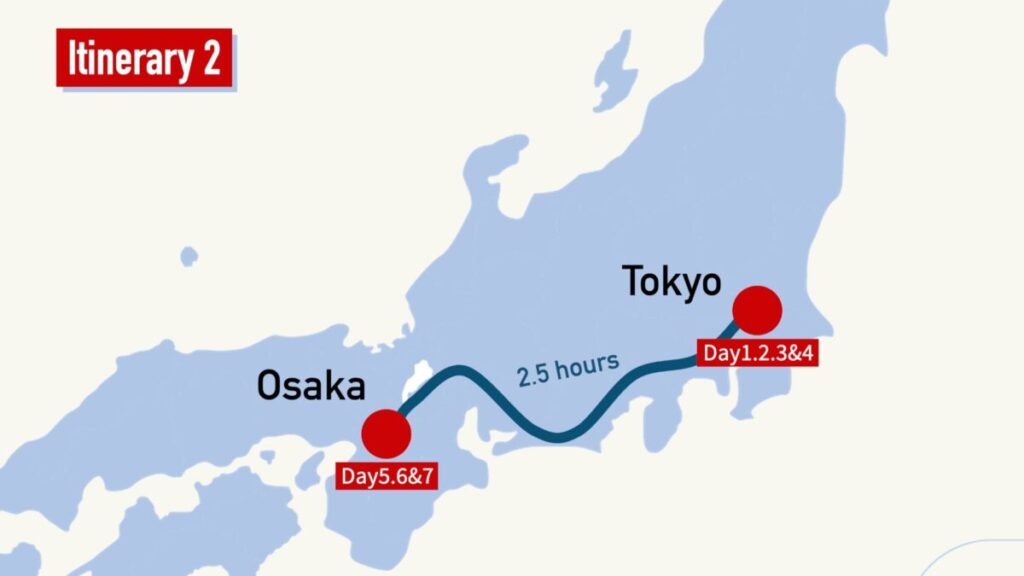

The Ultimate Urban Adventure for City Lovers, Foodies, and First-Time Travelers
Who is this route for?
This itinerary is perfect if you:
- Are visiting Japan for the first time and want a simple, city-focused plan
- Have only one week and want to minimize travel fatigue
- Love shopping, street food, nightlife, and modern culture
- Are flying into Tokyo and out of Osaka (or vice versa)
Why choose Tokyo and Osaka?
If you’re short on time but want maximum experience per day, Tokyo and Osaka are unbeatable. You’ll get:
- The contrast of Japan’s two biggest cities
- A mix of modern pop culture (Tokyo) and street-level energy and food culture (Osaka)
- Efficient travel: just one high-speed train ride in between (2.5 hours)
You won’t need to worry about regional trains, luggage forwarding, or weather delays in the mountains. It’s clean, direct, and full of flavor—literally and figuratively.



Spring’s beautiful, sure—but autumn is the real MVP. You get that “Japan magic” without playing dodgeball with selfie sticks. And Hakone in winter? If the air’s dry, Fuji shows up like it’s posing just for you.
Best time to go
| Season | Highlights | Watch out for |
|---|---|---|
| Spring (Mar–May) | Cherry blossoms in parks and riversides | Higher hotel prices during sakura season |
| Summer (Jun–Aug) | Festivals, fireworks, long daylight | High heat and humidity (especially August) |
| Autumn (Oct–Nov) | Fall colors in urban gardens | Book in advance—very popular season |
| Winter (Dec–Feb) | Illuminations, crisp skies, less crowd | Cold but manageable, especially in cities |
7-Day Tokyo–Osaka Itinerary Overview


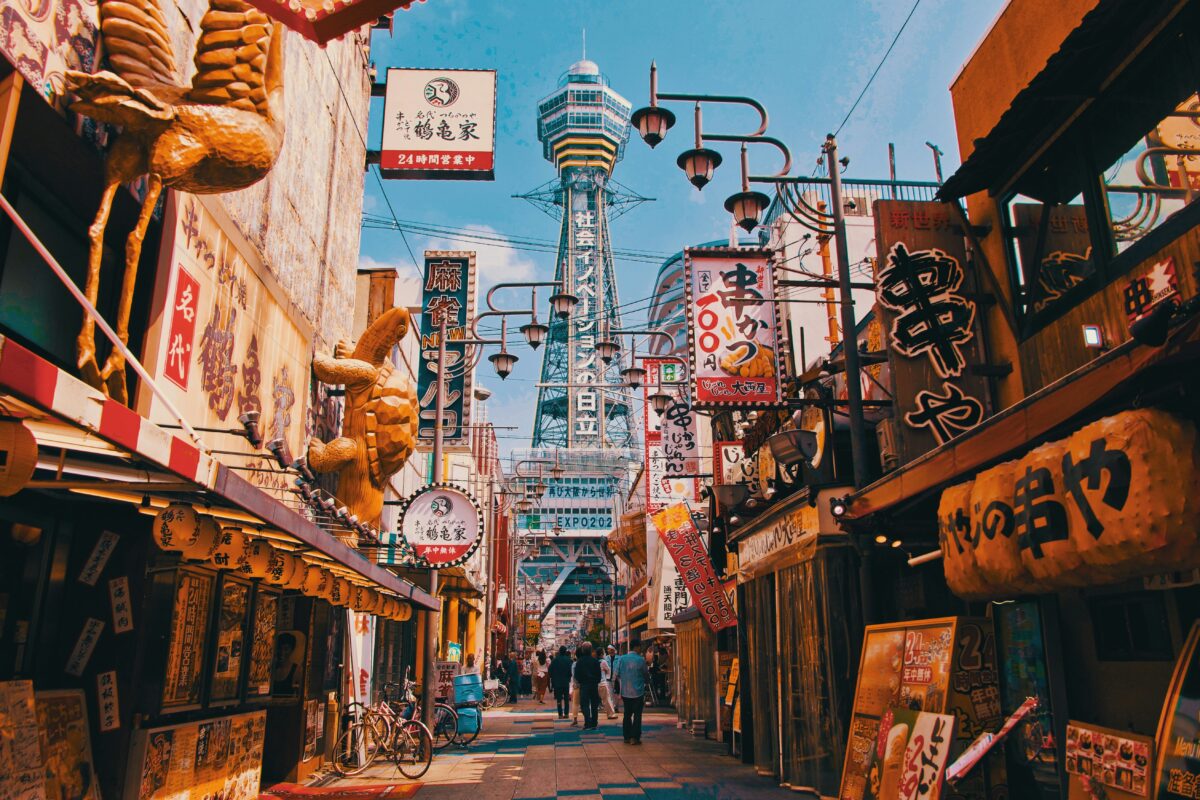

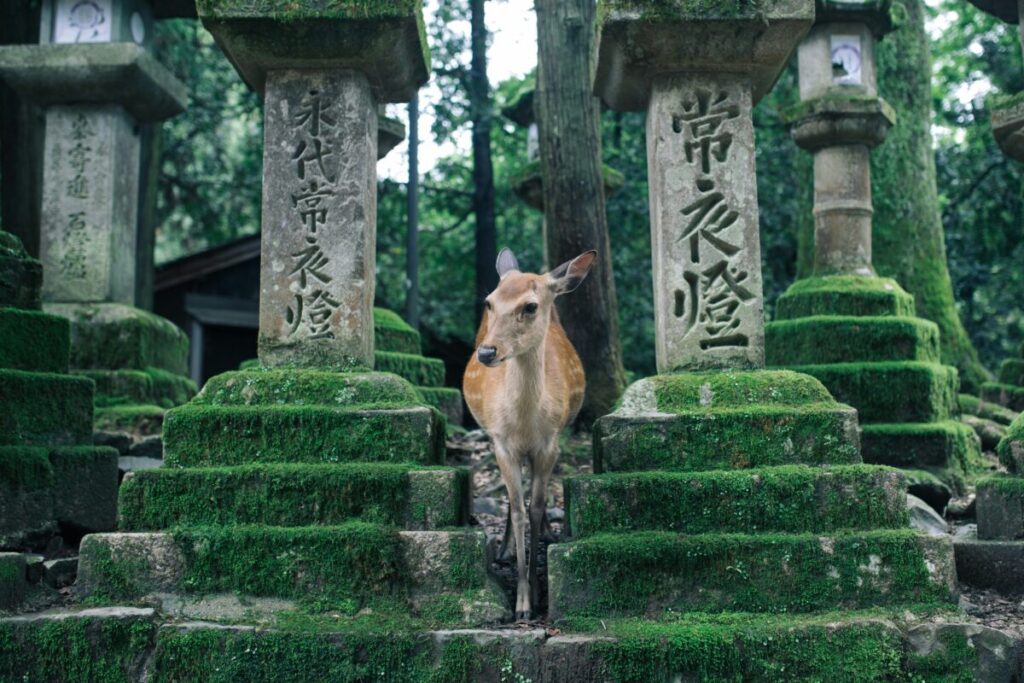

Day 1 – Arrive in Tokyo
- Arrive at Haneda or Narita
- Check-in near Shinjuku, Asakusa, or Ginza
- Optional: Walk around the neighborhood, eat dinner at a local izakaya
Day 2 – Tokyo: Traditional + Modern
- Morning: Visit Meiji Shrine and Harajuku
- Afternoon: Explore Shibuya, shop in Omotesando or Shinjuku
- Evening: Tokyo Tower or Shibuya Sky observation deck
Day 3 – Tokyo: Hidden Corners
- Morning: Visit Tsukiji Market or teamLab Planets
- Afternoon: Yanaka, Kichijoji, or Shimokitazawa (local neighborhoods)
- Optional: Book a cultural experience (kimono rental, cooking class)
Day 4 – Tokyo to Osaka
- Morning: Take the Shinkansen (~2.5 hours)
- Afternoon: Explore Dotonbori and Namba area
- Evening: Try Osaka-style street food (takoyaki, okonomiyaki)
Day 5 – Osaka: Day Trip or Deep Dive
- Option A: Day trip to Himeji Castle or Nara
- Option B: Spend more time in Osaka: Kuromon Market, Shinsekai, Umeda Sky Building
- Evening: Explore Tenma or Nakazakicho for bars and small restaurants
Day 6 – Osaka: Theme Park or Relaxed Stroll
- Option A: Universal Studios Japan (if you’re a theme park fan)
- Option B: Osaka Castle, museum visits, or spa time at Spa World
- Final evening: Sunset at Tempozan Ferris Wheel or river cruise
Day 7 – Departure
- Easy morning at hotel or last-minute shopping (Namba Parks, Abeno Harukas)
- Head to Kansai International Airport (~50 min via Nankai Line)
Transportation Costs
| Route or Item | Estimated Cost (JPY) |
|---|---|
| Tokyo → Osaka (Shinkansen, one way) | ~¥15,000 |
| Local trains and subways (7 days total) | ~¥5,000–6,000 |
| Optional: JR Pass (7-day) | ~¥50,000 (only worth it if doing side trips to Kyoto, Nara, etc.)(~$330) |
Total Budget Estimate (per person, mid-range style)
| Category | Cost |
|---|---|
| Accommodation (6 nights × ¥12,000) | ¥72,000 |
| Transportation | ¥20,000 |
| Food & Snacks (¥6,000/day) | ¥42,000 |
| Sightseeing & Activities | ¥10,000–15,000 |
| Total Estimate | ¥145,000–150,000 (~USD $900–1,000) |



Don’t let the JR Pass FOMO get you—it’s not a magic train ticket for every trip. For this Tokyo–Osaka route, it often costs more than it saves unless you’re bouncing to Nara or Hiroshima too.
Pro Tips from a Local
- Book your Shinkansen tickets at least 1 day in advance to secure good times
- If visiting in summer, always carry a hand towel, sunscreen, and a foldable umbrella
- Want a quieter Tokyo stay? Try neighborhoods like Kiyosumi-Shirakawa or Daikanyama
- In Osaka, explore side alleys around Tenma Station for hidden bars and local eateries
③Japan Itinerary 7 Days: Tokyo, Kanazawa, Kyoto
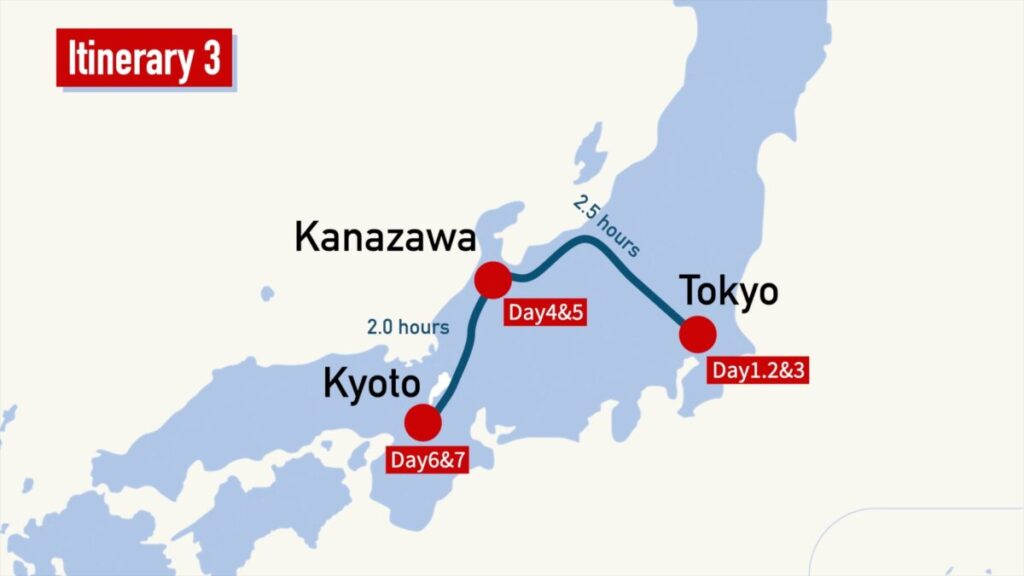

A Cultural Triangle for First-Timers Seeking Depth Beyond the Obvious
Who Is This Itinerary For?
- Travelers who have already visited Osaka or want a quieter, more cultural alternative
- Those interested in architecture, art, and traditional neighborhoods
- Visitors arriving in Tokyo and departing from Kansai International Airport (KIX)
- Food lovers who want to explore regional specialties
Why Why Choose This Route?
While many travelers default to Tokyo–Kyoto–Osaka, this 7-day itinerary offers a more refined cultural triangle. It combines the energy of Tokyo, the preserved Edo charm of Kanazawa, and the spiritual beauty of Kyoto—without the crowds of Osaka and with a smoother travel flow.
This route is especially ideal for travelers seeking meaningful experiences in walkable, mid-sized cities that are rich in tradition, design, and cuisine.



Most people rush through Tokyo–Kyoto–Osaka like it’s a race.
But if you’re craving a slower pace, fewer crowds, and cities that actually reward wandering?
This route’s your sweet spot.
Also, Kanazawa? Total hidden gem. Think Kyoto vibes without the tour bus traffic—and yes, the sushi is legit.
Best Time to Go
| Season | Highlights | Considerations |
|---|---|---|
| Spring (Mar–May) | Cherry blossoms in Kanazawa and Kyoto | Book hotels early during peak bloom |
| Summer (Jun–Aug) | Festivals, fresh seafood, lush gardens | Humid in cities, pack light clothing |
| Autumn (Oct–Nov) | Fall foliage, especially in Kyoto temples | Slight price increase in November |
| Winter (Dec–Feb) | Snow in Kanazawa, peaceful shrines | Cold mornings, prepare winter gear |
7-Day Itinerary Overview


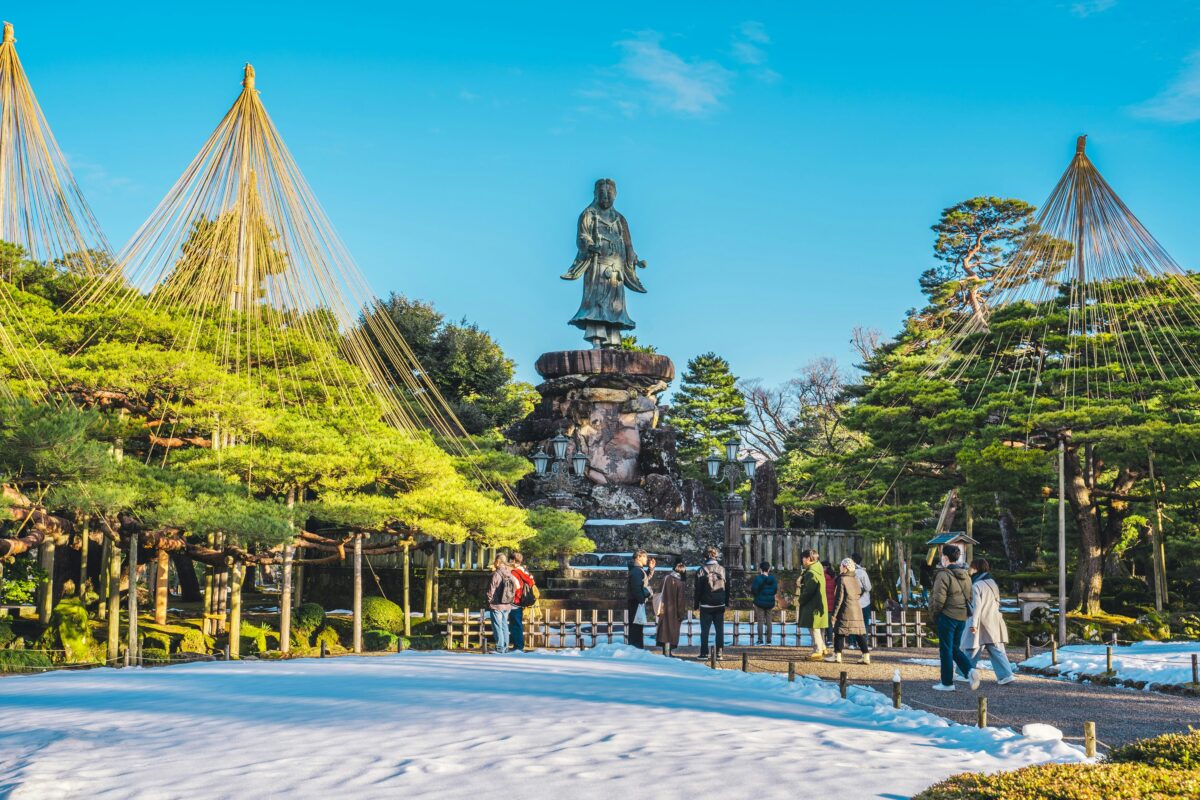

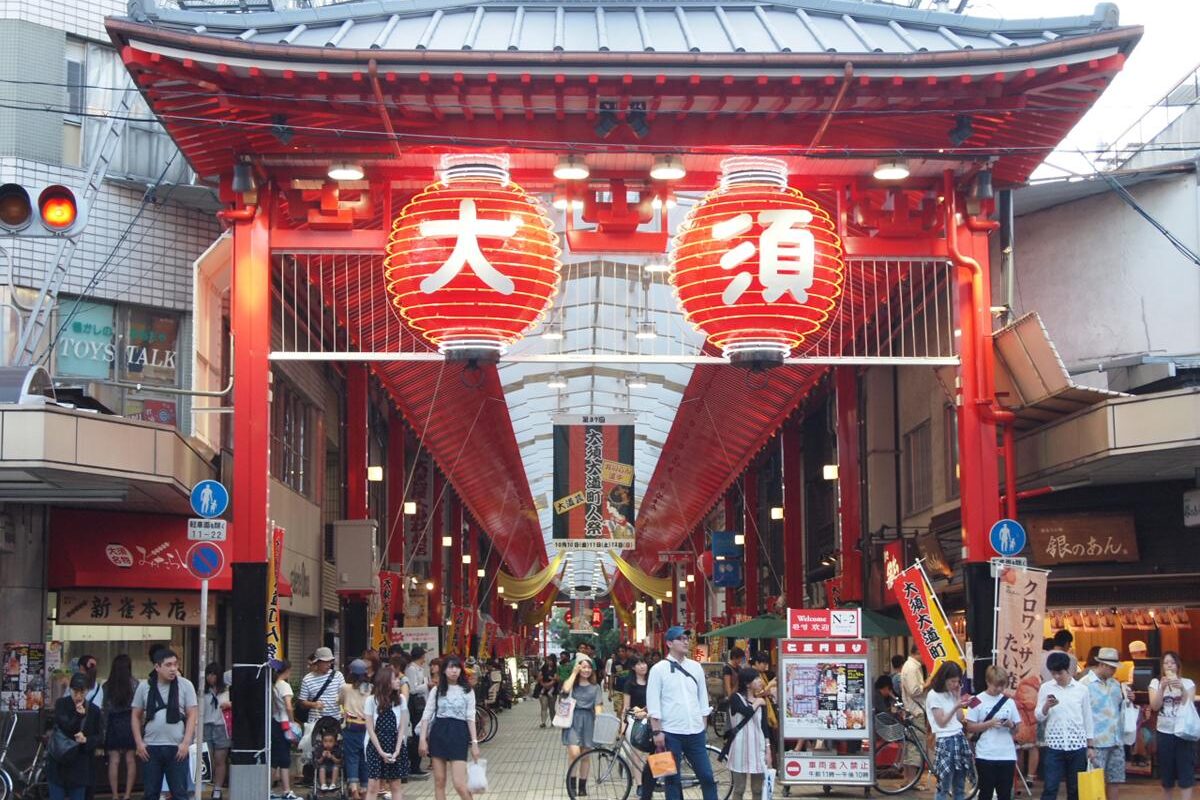

Day 1 – Arrive in Tokyo
- Land at Haneda or Narita
- Explore Shinjuku, Tokyo Station, or Asakusa depending on your arrival time
- Optional: Early dinner at Omoide Yokocho or sushi in Tsukiji area
Day 2 – Tokyo Highlights
- Morning: Senso-ji Temple, Tokyo Skytree
- Afternoon: Omotesando + Meiji Shrine or Ueno museums
- Evening: Night views from Shibuya Sky or Tokyo Tower
Day 3 – Tokyo Hidden Gems
- Morning: Yanaka (old Tokyo vibes)
- Afternoon: teamLab Planets or art museums in Roppongi
- Optional: Cultural workshop (calligraphy, tea ceremony, etc.)
Day 4 – Tokyo to Kanazawa
- Morning: Take the Hokuriku Shinkansen (~2.5 hrs)
- Afternoon: Explore Kenrokuen Garden and Kanazawa Castle
- Evening: Stay in a machiya-style inn and eat local kaisendon (seafood rice bowl)
Day 5: Explore Kanazawa
- Morning: 21st Century Museum of Contemporary Art
- Afternoon: Higashi Chaya District, gold leaf shops, samurai neighborhood
- Optional: Kimono or samurai armor experience
Day 6: Kanazawa to Kyoto
- Morning: Take the Limited Express Thunderbird (~2 hrs)
- Afternoon: Explore Nishiki Market, stroll through Gion
- Evening: Dine on Kyoto-style kaiseki or visit a local izakaya
Day 7: Kyoto Highlights and Departure
- Morning: Visit Kiyomizu-dera Temple and walk through Ninenzaka and Sannenzaka
- Optional: Stop at Fushimi Inari Shrine if your flight is later in the day
- Afternoon: Depart from Kansai International Airport (KIX) — accessible via JR or private rail lines from Kyoto Station (approx. 75–90 minutes)
Transportation Cost Estimate
| Segment | Estimated Price |
|---|---|
| Tokyo → Kanazawa (Shinkansen) | ¥14,000 |
| Kanazawa → Kyoto (Ltd. Express) | ¥7,000 |
| Local transportation | ¥5,000 |
| Total (without JR Pass) | ¥26,000 |
Tip: If you plan side trips or a return to Tokyo, the Japan Rail Pass (7 days, ~¥50,000) may offer better value.
Total Trip Budget (Per Person, Mid-range)
| Category | Estimated Cost |
|---|---|
| Accommodation (6 nights) | ¥72,000 (¥12,000/night avg.) |
| Transportation | ¥26,000 |
| Food (¥6,000/day × 7) | ¥42,000 |
| Activities & admissions | ¥10,000–15,000 |
| Total | ¥150,000–160,000 (~USD $950–1,050) |



This route’s easy on the wallet and the nerves.
Unless you’re planning to zigzag back to Tokyo, skip the JR Pass.
Use that extra ¥20,000 for sushi in Kanazawa—you’ll thank me later.
Local Travel Tips
- Kanazawa’s samurai and geisha districts are best explored before 10 a.m. to avoid large tour groups
- Staying in a machiya (traditional townhouse) offers a unique and quiet lodging experience
- In Kyoto, visit major temples early in the day—Kiyomizu-dera and Fushimi Inari get crowded by mid-morning
- Kansai International Airport (KIX) is efficient and accessible from Kyoto in about 75–90 minutes by train
④Japan Itinerary 7 Days: Kyoto, Takayama, Nagoya
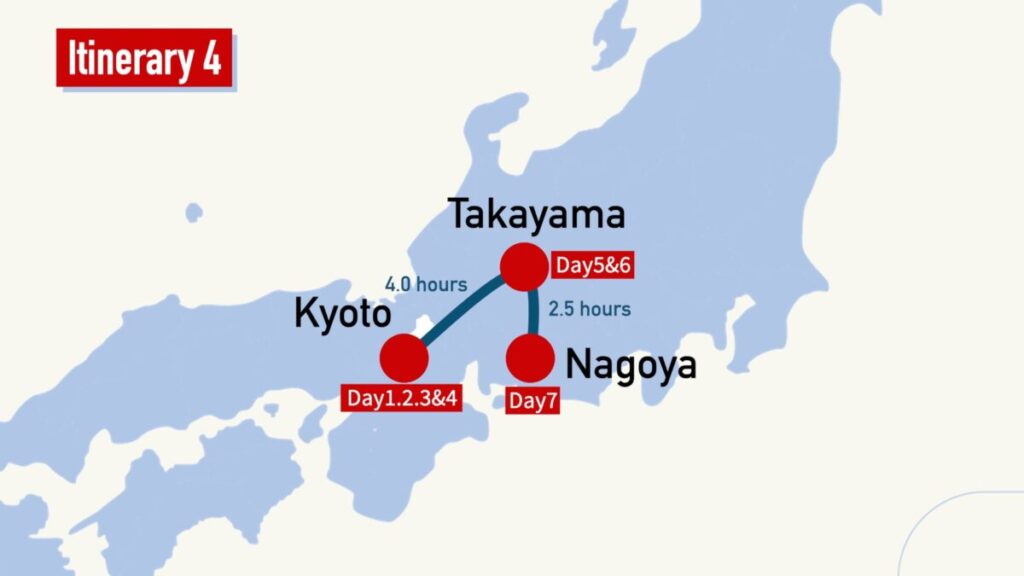

A Traditional Journey Through Temples, Mountains, and Local Culture
Who is this route for?
This route is perfect for:
- Travelers who want to dive into traditional Japanese architecture and countryside charm
- Fans of ryokan stays, quiet towns, and historical ambiance
- Couples or solo travelers looking for a slower, more reflective pace
- Visitors entering via Kansai (Osaka/Kyoto) and departing from Nagoya
Why choose this route?
While Tokyo and Osaka offer buzz and scale, this itinerary focuses on heritage, mountain towns, and authentic rhythm. You’ll explore:
- Kyoto: the heart of Japan’s spiritual and cultural traditions
- Takayama: a preserved Edo-era town in the Japanese Alps
- Nagoya: an often-overlooked city with a vibrant local food culture and efficient airport access
The journey flows west to east, avoiding backtracking while taking in some of Japan’s most atmospheric locations.



Morning in Takayama hits different. Walk along the riverside path and it honestly feels like time slows down.
Yeah, there’s a Lawson down the street—but somehow it still feels like Edo-era Japan.
If you’re craving a slower, more reflective pace, this route just gets it.
Best Time to Go
| Season | Highlights | Notes |
|---|---|---|
| Spring (Mar–May) | Cherry blossoms in Kyoto, mild mountain weather | Book ryokans early in Takayama |
| Autumn (Oct–Nov) | Vibrant fall colors and traditional festivals | Especially beautiful in the mountains |
| Summer (Jun–Aug) | Lush greenery, festivals in Gifu | Hot in Kyoto, but cooler in Takayama |
| Winter (Dec–Feb) | Snow-covered villages, onsen comfort | Be prepared for snow in Takayama and Gifu |
7-Day Itinerary Overview
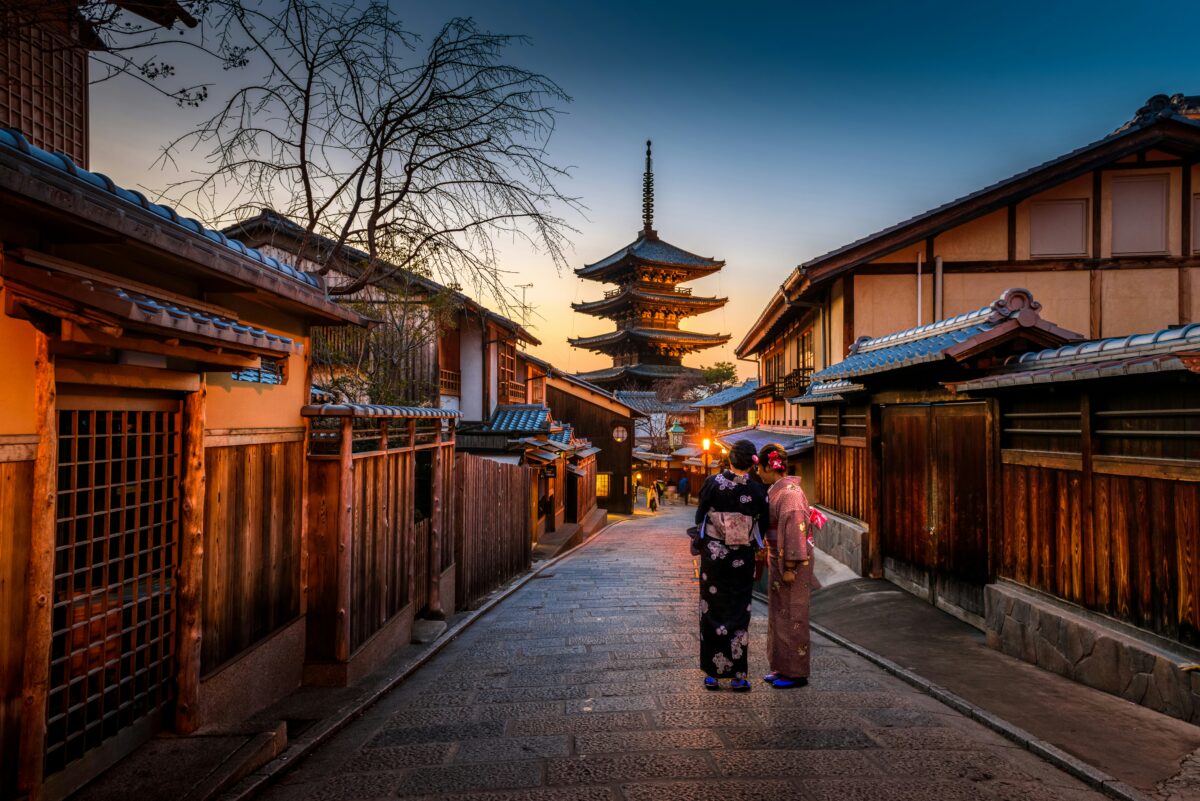

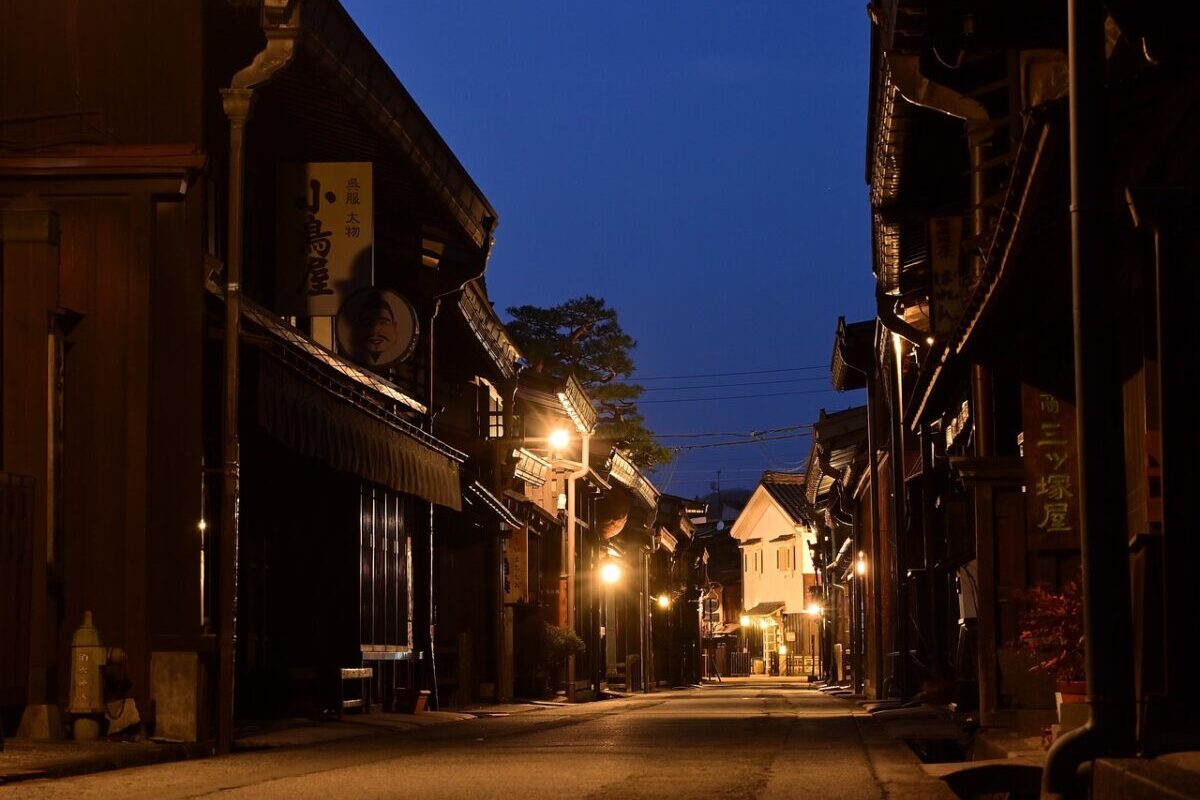



Day 1 – Arrive in Kyoto
- Land at Kansai International Airport (KIX) or arrive via Osaka
- Check into a machiya or hotel near Gion or Kawaramachi
- Easy start: walk along the Kamogawa River, explore Pontocho alley
Day 2 – Kyoto Classics
- Morning: Fushimi Inari Taisha
- Afternoon: Kiyomizu-dera and Higashiyama
- Evening: Explore Gion or book a tea ceremony experience
Day 3 – Kyoto Hidden Sights
- Morning: Arashiyama Bamboo Grove (early)
- Afternoon: Visit lesser-known temples like Daikaku-ji or Eikando
- Optional: Kyoto-style kaiseki dinner or craft workshop
Day 4 – Kyoto to Takayama
- Travel via Shinkansen + Limited Express Hida (~3.5 hrs)
- Check in to ryokan with onsen in Takayama
- Evening: Stroll the preserved old town and dine on Hida beef
Day 5 – Explore Takayama
- Morning: Miyagawa Morning Market, Takayama Jinya
- Afternoon: Visit Hida Folk Village or join a local craft tour
- Optional: Onsen soak or guided sake tasting
Day 6 – Takayama to Nagoya
- Morning: Take the train (~2.5 hrs)
- Afternoon: Explore Osu shopping district or visit Nagoya Castle
- Evening: Dinner of miso katsu, kishimen, or hitsumabushi
Day 7 – Nagoya & Departure
- Morning: Visit SCMAGLEV and Railway Park (great for families too)
- Depart via Chubu Centrair International Airport (~40 min by train)
Transportation Cost Estimate
| Segment | Price |
|---|---|
| Kyoto → Takayama | ~¥8,000 (via Nagoya + Limited Express) |
| Takayama → Nagoya | ~¥5,000 |
| Local transport | ~¥4,000 total |
| Total | ~¥17,000 |
Optional: Consider Takayama-Hokuriku Area Pass if adding Kanazawa or Toyama.
Budget Estimate (Mid-range style)
| Category | Cost |
|---|---|
| 6 nights accommodation | ¥70,000–85,000 (including 1–2 ryokan nights) |
| Transportation | ~¥17,000 |
| Meals & snacks | ~¥42,000 |
| Cultural activities, entrance fees | ~¥10,000 |
| Total | ~¥145,000–155,000 (~USD $950–1,050) |
Local Tips from a Japanese Insider



That left-side window seat from Takayama to Nagoya? Trust me—don’t sleep on it.
It’s one of those slow, scenic rides where even the vending machines at tiny rural stations feel poetic.
- Avoid Takayama in early January—it’s peaceful but many places close for New Year’s
- Book your ryokan in Takayama at least a month ahead (especially on weekends)
- In Kyoto, wake up early—temples like Fushimi Inari are magical before 8 a.m.
- For a scenic ride, sit on the left side of the train from Takayama to Nagoya
④Japan Itinerary 7 Days: Kyoto, Takayama, Nagoya
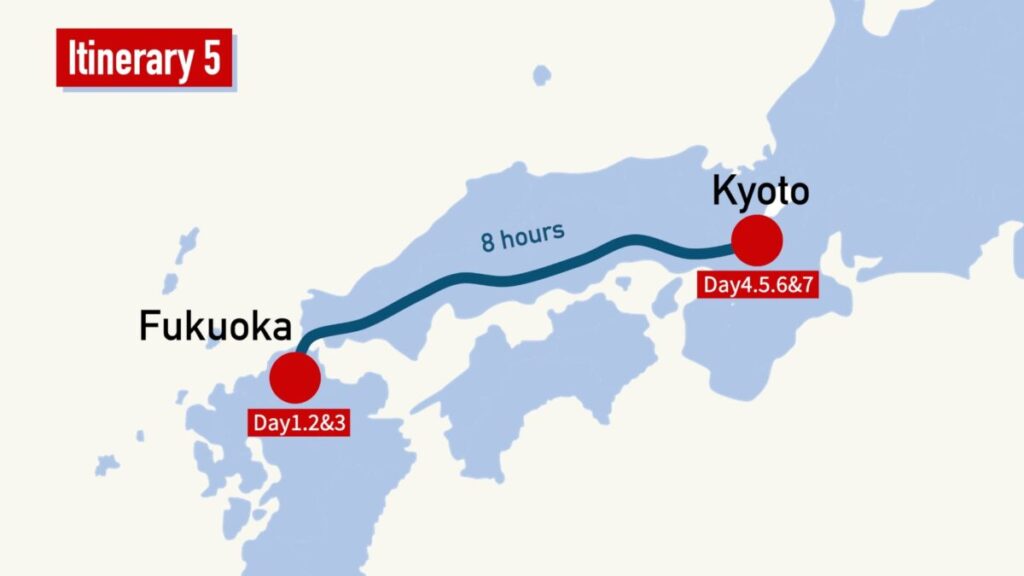

A West Japan Route for Food Lovers and Culture Seekers
Who is this route for?
This itinerary is best suited for:
- Travelers who want to combine food, history, and tradition
- Those flying into Fukuoka from Southeast Asia or Korea
- People looking to avoid overly touristy areas while still seeing iconic Japan
- Visitors interested in temples and ramen, not rush and crowds
Why choose this route?
Fukuoka and Kyoto offer a perfect contrast:
- Fukuoka is relaxed, local, and filled with street food and waterfront walks
- Kyoto is spiritual, traditional, and visually stunning
Both cities are compact, walkable, and culturally rich.
This route is ideal for travelers who want to take their time and savor every moment—without packing and unpacking every night.
You’ll only need one major train ride between the cities, and both are served by efficient airports and public transport.



Kyoto’s all about matcha and mindfulness. Fukuoka? Tonkotsu ramen and riverside beers.
This route is for people who don’t need to see everything—just the good stuff, at the right pace.
Best Time to Go
| Season | Highlights | Things to Consider |
|---|---|---|
| Spring (Mar–May) | Sakura in Kyoto, riverside in Fukuoka | Peak season: hotels fill up fast |
| Autumn (Oct–Nov) | Fall foliage, mild weather | Beautiful but busy—book early |
| Summer (Jun–Aug) | Gion Festival, local matsuri | Hot and humid, but vibrant |
| Winter (Dec–Feb) | Illuminations, fewer crowds | Cold, but Kyoto looks beautiful in snow |
7-Day Itinerary Overview
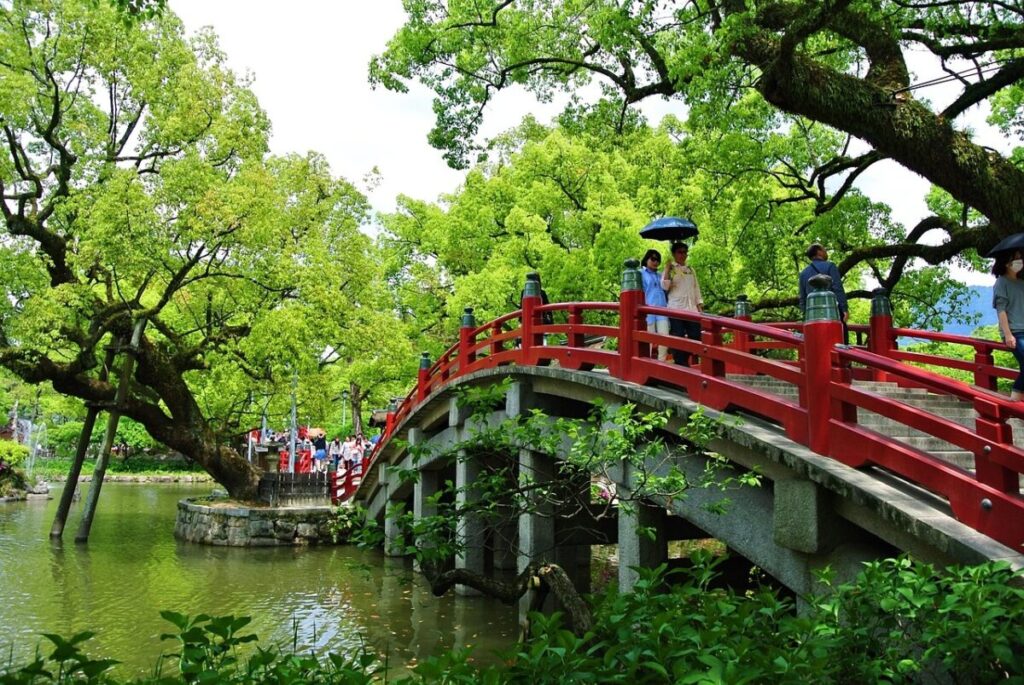





Day 1 – Arrive in Fukuoka
- Fly into Fukuoka Airport (international connections from Taiwan, Korea, SEA)
- Explore Canal City and stroll along Nakasu riverside
- Try yatai street food stalls at night (ramen, yakitori, tempura)
Day 2 – Fukuoka City Sights
- Morning: Ohori Park and Fukuoka Castle Ruins
- Afternoon: Visit the Kyushu National Museum or shop at Tenjin
- Optional: Onsen time at Uminonakamichi Seaside Park or nearby resorts
Day 3 – Fukuoka Day Trip
- Option A: Dazaifu Tenmangu Shrine (40 min by train)
- Option B: Yanagawa Canal boat cruise
- Evening: Enjoy Hakata-style ramen at Ichiran HQ or local tonkotsu shop
Day 4 – Fukuoka to Kyoto
- Morning: Take the Shinkansen (~3 hours)
- Afternoon: Check in to a machiya or hotel near Gion
- Stroll along the Kamo River or visit Nishiki Market for local bites
Day 5 – Kyoto Highlights
- Morning: Kinkaku-ji (Golden Pavilion)
- Afternoon: Nijo Castle or Arashiyama area
- Evening: Gion district or attend a cultural performance (Maiko show, theater)
Day 6 – Kyoto Culture Deep Dive
- Morning: Fushimi Inari Shrine (early to beat crowds)
- Afternoon: Higashiyama and Kiyomizu-dera Temple
- Optional: Book a tea ceremony, kimono rental, or traditional craft experience
Day 7 – Kyoto Morning & Departure
- Relaxed breakfast at a local café
- Souvenir shopping or final temple visit
- Depart via Kansai International Airport or Kyoto Station → Shin-Osaka → airport
Transportation Costs
| Route | Estimated Cost |
|---|---|
| Fukuoka → Kyoto (Shinkansen) | ~¥15,000 |
| Local trains (7 days) | ~¥5,000 |
| Total | ~¥20,000 |
→ No JR Pass needed unless continuing elsewhere
Budget Estimate (Mid-range Traveler)
| Category | Estimate |
|---|---|
| Accommodation (6 nights × ¥10,000–13,000) | ~¥65,000–78,000 |
| Transportation | ~¥20,000 |
| Food & Snacks | ~¥40,000 |
| Sightseeing & Experiences | ~¥10,000 |
| Total | ¥135,000–150,000 (~USD $900–1,000) |
Local Tips from a Japanese Native
- Fukuoka’s ramen shops are open late—perfect for jet-lagged arrivals
- Book your Shinkansen ticket from Fukuoka to Kyoto at least one day in advance
- Kyoto’s temples are busiest from 10 am to 2 pm—go early or late for peace
- For the best cultural immersion, stay at a machiya townhouse in Kyoto



Fukuoka is relaxed, local, and filled with street food and waterfront walks
⑥Japan Itinerary 7 Days: Tokyo, Nikko, Kanazawa & Matsumoto
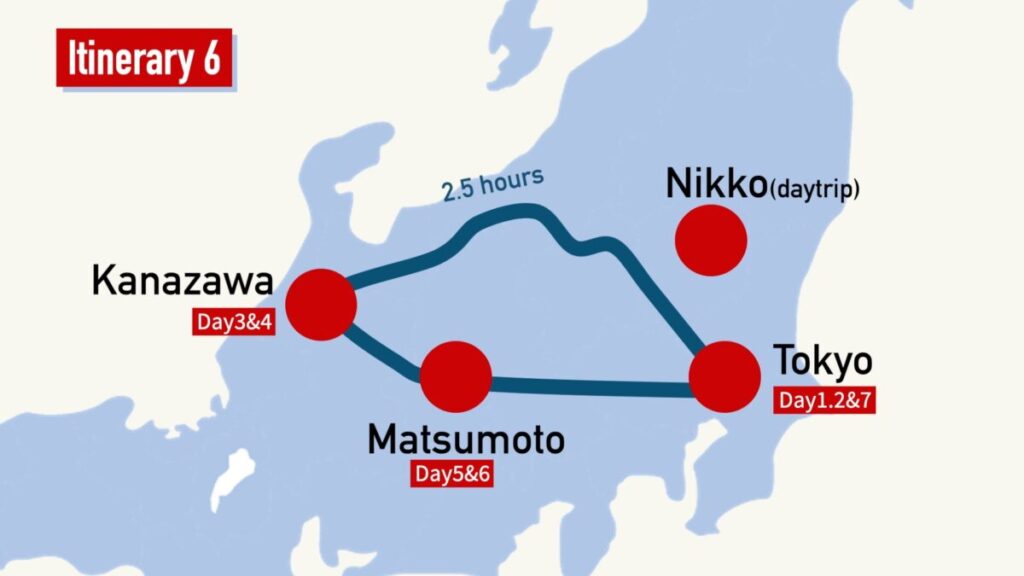

A Refined Cultural Journey Through Japan’s Heritage Cities
Who is this route for?
This itinerary is perfect for:
- First- or second-time visitors wanting a less crowded alternative to Kyoto
- Travelers interested in architecture, local history, and design
- Photographers and cultural explorers
- Visitors flying into and out of Tokyo
Why Choose This Route?
Skip the usual Tokyo–Kyoto loop and explore a more curated cultural triangle through Japan’s east and center. This itinerary blends historical depth, traditional neighborhoods, and iconic landmarks—from Nikko’s grand shrines to Kanazawa’s samurai-era charm and Matsumoto’s iconic castle, with zero domestic flights and a logical overland route.



Fewer crowds, more character.
This route’s like Japan’s greatest hits album—but remastered for people who actually read the liner notes.
And hey—Matsumoto Castle at dusk? Bring your camera. You’ll want proof you were there before the world finds out.
Best Time to Go
| Season | Highlights | Considerations |
|---|---|---|
| Spring (Mar–May) | Cherry blossoms in Kanazawa & Matsumoto | Book early during peak sakura season |
| Summer (Jun–Aug) | Greenery, festivals, fresh seafood | Humid in Tokyo, pleasant in Alps |
| Autumn (Oct–Nov) | Fall foliage in mountain towns and gardens | High demand for ryokans |
| Winter (Dec–Feb) | Snow in Kanazawa, peaceful shrines | Cold weather, snow delays possible |
7-Day Itinerary Overview
Day 1 – Arrive in Tokyo
- Land at Haneda/Narita
- Check in to Shinjuku or Ueno area
- Optional: Stroll Asakusa, Tokyo Tower, or local izakaya night
Day 2 – Day Trip to Nikko
- Take Tobu Limited Express (~2 hrs)
- Visit Toshogu Shrine, Shinkyo Bridge, and Kanmangafuchi Abyss
- Optional: Lake Chuzenji and Kegon Falls (if early start)
- Return to Tokyo in the evening
Day 3 – Tokyo to Kanazawa
- Take the Hokuriku Shinkansen (~2.5–3 hrs)
- Afternoon: Visit Kenrokuen Garden and Kanazawa Castle
- Evening: Stay in a machiya (traditional townhouse) and enjoy local kaisendon
Day 4 – Kanazawa Deep Dive
- Morning: Visit the 21st Century Museum of Contemporary Art
- Afternoon: Higashi Chaya District, Nagamachi Samurai District
- Optional: Try on samurai armor or a kimono rental experience
Day 5 – Kanazawa to Matsumoto
- Scenic train ride via Itoigawa or Nagano (~4–5 hrs total)
- Visit Matsumoto Castle and stroll Nakamachi-dori
- Stay in a ryokan or boutique hotel
Day 6 – Explore Matsumoto
- Morning: Japan Ukiyo-e Museum or walk along Metoba River
- Optional: Visit Daio Wasabi Farm or take a rural cycling tour
- Dinner: Handmade soba or mountain cuisine
Day 7 – Return to Tokyo & Departure
- Take Limited Express Azusa to Shinjuku (~2.5 hrs)
- Optional: Last-minute shopping at Tokyo Station
- Fly home from Haneda or Narita
Transportation Cost Estimate
| Segment | Estimated Cost |
|---|---|
| Tokyo → Nikko (RT) | ¥5,000 |
| Tokyo → Kanazawa (Shinkansen) | ¥14,000 |
| Kanazawa → Matsumoto (Ltd. Exp. & local) | ¥9,000 |
| Matsumoto → Tokyo | ¥6,000 |
| Local transportation | ¥5,000 |
| Total | ¥39,000 |
Tip: Use the JR East Tohoku Area Pass (¥20,000) for significant savings.
Total Budget Estimate (Mid-range)
| Category | Estimate (JPY) |
|---|---|
| Accommodation (6 nights incl. 1–2 ryokan) | ¥70,000–85,000 |
| Transportation | ¥39,000 |
| Food (¥6,000/day × 7) | ¥42,000 |
| Activities & admissions | ¥10,000–12,000 |
| Total | ¥160,000–178,000 (~USD $1,050–1,200) |
Insider Tips from a Local
- Nikko is a full-day trip—leave Tokyo early to beat tour bus crowds
- Kanazawa’s samurai and geisha districts are best enjoyed before 10 a.m.
- Stay in a machiya in Kanazawa for an immersive experience
- Matsumoto Castle is most photogenic right at opening (8:30 a.m.)
- You can store luggage at major stations for stress-free exploring
⑦Japan Itinerary 7 Days: Okinawa and Osaka
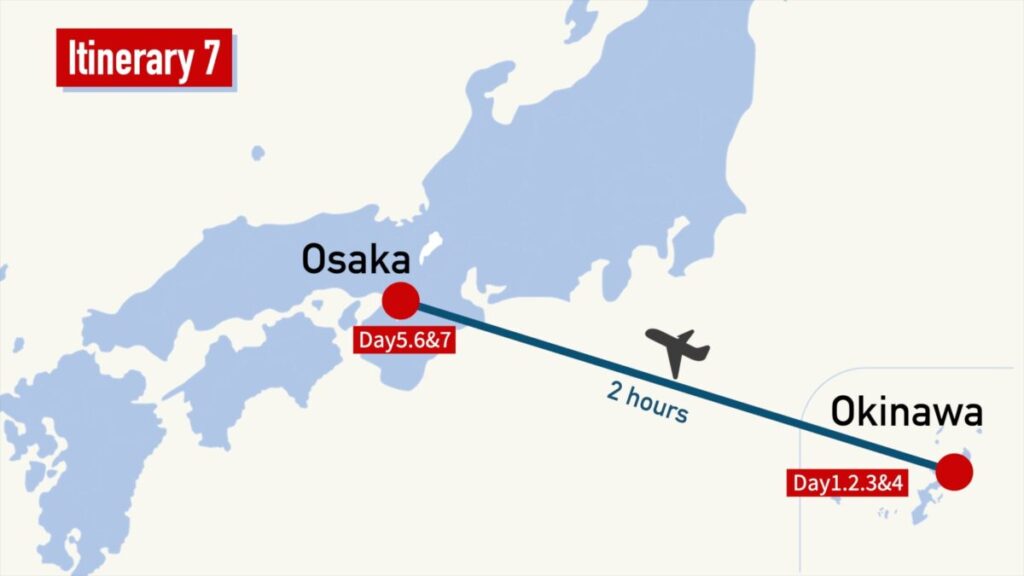

From Island Escape to Food Capital—A Unique Japan Journey
Who is this route for?
This itinerary is a great fit for travelers who:
- Want a warm-weather getaway, even in winter
- Are visiting Japan from Southeast Asia or flying via Korea/Taiwan
- Love beach vibes, snorkeling, and easygoing cities
- Want to combine tropical nature with urban food culture
- Prefer starting in Okinawa and flying to mainland Japan (no backtracking)
Why choose this route?
Most Japan itineraries focus on temples, trains, and cherry blossoms.
But Japan is an island nation—with tropical beaches, coral reefs, and a distinct island culture in Okinawa.
This 7-day plan gives you:
- A relaxing 3-day reset in Okinawa (without jetlag stress)
- A lively 3-day cultural feast in Osaka—Japan’s kitchen
- Efficient point-to-point travel with no need to return to Tokyo
It’s one of the most underrated routes, especially great for repeat visitors or winter travelers.



Most people land in Tokyo and never make it past Mt. Fuji. You? You’re kicking things off with turquoise water and taco rice.
This route’s for travelers who like their history with a side of sunshine—and maybe an Orion beer.
Best Time to Go
| Season | Okinawa | Osaka |
|---|---|---|
| Winter (Dec–Feb) | Mild (15–20°C), quiet beaches | Cold but festive (illuminations, hot food) |
| Spring (Mar–May) | Perfect beach weather | Sakura in parks, outdoor dining |
| Summer (Jun–Aug) | Hot, beach-friendly | Festivals & fireworks—but very humid |
| Autumn (Sep–Nov) | Best balance of heat & prices | Fall food season, great weather |
Avoid: Okinawa’s typhoon season (late Aug–Sept) unless you’re flexible.
7-Day Itinerary Overview
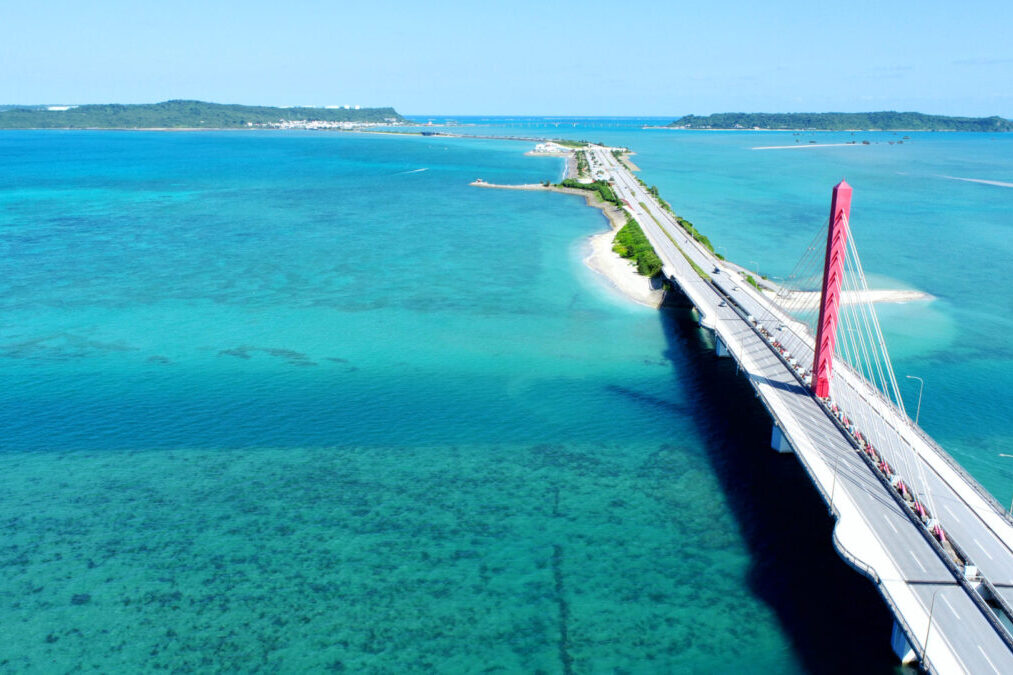



Day 1 – Arrive in Okinawa
- Land at Naha Airport (flights from Taipei, Seoul, Bangkok, etc.)
- Check in to hotel near Kokusai-dori or beach area
- Sunset walk, early dinner (try Okinawan soba or taco rice)
Day 2 – Okinawa’s Nature & Culture
- Morning: Visit Shurijo Castle or Okinawa World (cultural village)
- Afternoon: Head to Cape Manzamo or Churaumi Aquarium
- Optional: Snorkeling or beachside café time
Day 3 – Island Relaxation
- Option A: Beach day at Emerald Beach or Zampa
- Option B: Half-day island hopping (e.g., Tokashiki)
- Evening: Explore Naha city food stalls or local izakaya
Day 4 – Fly to Osaka
- Morning: Direct flight from Okinawa to Kansai International Airport (~2 hours)
- Afternoon: Check into hotel near Namba or Umeda
- Walk through Dotonbori, eat takoyaki, okonomiyaki, and explore Kuromon Market
Day 5 – Explore Osaka
- Morning: Visit Osaka Castle or Sumiyoshi Taisha
- Afternoon: Visit the retro Shinsekai district or Umeda Sky Building
- Optional: Go bar-hopping in Tenma or attend a comedy show (Osaka = birthplace of Japanese comedy)
Day 6 – Day Trip or Deep Dive
- Option A: Day trip to Nara (deer park, Todaiji Temple)
- Option B: Explore local markets, Osaka Museum of Housing & Living
- Optional: Enjoy spa time at Spa World or Solaniwa Onsen
Day 7 – Departure
- Easy breakfast and stroll
- Depart from Kansai International Airport (KIX)
Transportation Costs
| Route | Estimated Cost |
|---|---|
| Okinawa → Osaka (Flight) | ¥6,000–12,000 (LCCs like Peach, Jetstar) |
| Local trains (Osaka) | ~¥3,000–5,000 |
| Optional day trip to Nara | ~¥1,500 |
| Total | ~¥10,000–18,000 |
Tip: Book early for cheap Okinawa–Osaka flights (as low as ¥5,000 off-season)
Budget Estimate (Mid-range Traveler)
| Category | Cost |
|---|---|
| Flights (int’l + domestic) | Variable, ~¥20,000–40,000 |
| Accommodation (6 nights × ¥10,000–12,000) | ¥65,000–75,000 |
| Transport & Transfers | ¥10,000–18,000 |
| Food & Experiences | ¥40,000–50,000 |
| Total | ~¥135,000–165,000 (~USD $900–1,100) |
Local Tips from a Native Insider
- Okinawa buses are slow—consider renting a car if confident driving
- In Osaka, avoid peak times on public transport (8–9am, 6–7pm)
- If possible, stay in Okinawa on a weekday for better rates and quiet beaches
- For unique gifts: buy Okinawan salt, beni-imo sweets, or Ryukyu glass



Don’t let the laid-back vibe fool you—Okinawa’s got layers.
You’ll land for the beaches, stay for the food, and leave wondering why everyone else is still in Tokyo.
Just… don’t rely on the buses if you’ve got dinner plans.

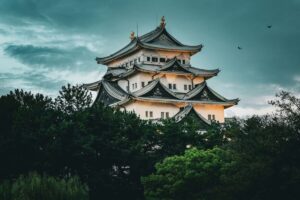
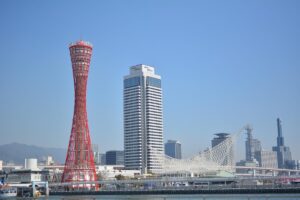
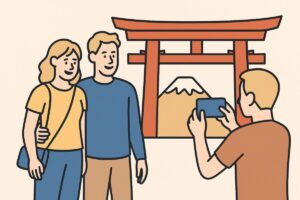
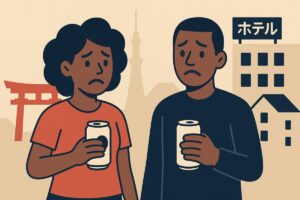
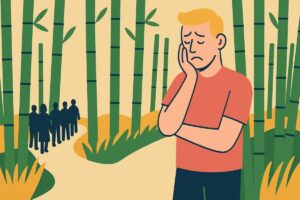
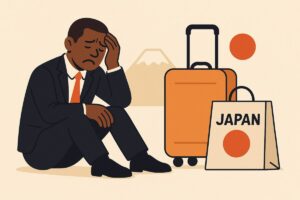
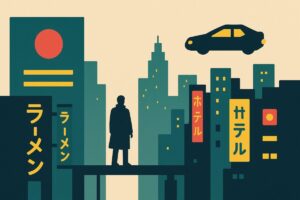
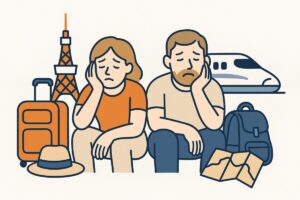
Comments